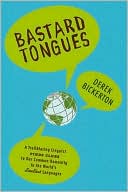Ye Olde Natural Philosophy Discussion Group
Reviews and comments on
Derek Bickerton:
Bastard Tongues [2008]

This book is about linguistics, and specifically about pidgins and creoles, which are often considered the lowliest of languages, or “bastard tongues”. The author presents the theory, which seems very plausible to our group, that pidgins are sort of proto-languages created by adults from different language communities who have come together to live and work, and that these pidgins then get transformed into full-fledged languages (called “creoles” in these cases) by their children. Bickerton also shows that different creoles, from very different parts of the world, nevertheless develop some very similar grammatical structures, which shows that there is indeed some internal language construction facility in human beings which operates along fairly specific lines. This accounts for why and how young children are capable of turning pidgins into full-scale languages!
Rosie and Scott both loved this book and gave it ratings of 10, while most of the rest of our group gave it ratings in the middle range. Rosie was especially fond of the Bickerton’s cleverness in investigating people’s language, by hanging out in bars, by leaving his running tape recorder supposedly “unattended” while he went across the room, and so forth.
Kirby, however, thought the book “sucked” (and gave it only a 4). He thought it was much too informal and too autobiographical. Most of the rest of us, however, liked those aspects of the book. On the other hand, Kirby also thought that the book was too technical in many places, and he read out one particularly obscure technical passage to demonstrate this. Many others agreed with him on this point, although most of us felt that the occasional technical examples and passages were not that much of a problem, and could easily be skipped over by those not interested in such details in Bickerton’s argument. Kirby thought the scientific argument in the book could have been condensed down to a 20-page “white paper”, but others of us felt that the result wouldn’t have been nearly so much fun if it had been.
Kirby also felt that Bickerton was marginally racist. On this point Scott strongly disagreed. Scott does grant that there is quite an opportunist element in Bickerton’s character. Bickerton himself admitted that he crossed a picket line when it became in his career interest to do so, though he was supposedly a long-time supporter of unions. And for the same self-serving reason he backed off in his support for a Marxist professor who was being fired for his politics. But being unprincipled on matters like that is not the same as being a racist. Actually, Bickerton demonstrated that he enjoyed the company of the lower-class people who spoke pidgins and creoles and merged very well with them. Scott, as a Marxist, was quite impressed with this, because the frequent failure to do this sort of thing is one of the shortcomings of leftist political movements that often have their origin and original political base among middle-class students in universities.
Our guest, Forrest Bennett, who is a member of a different Bay Area book club, said that he was surprised to find that he enjoyed the biographical stuff in the book. Forrest liked the book, and rated it a 7, but agreed that the scientific content could have been much condensed, perhaps even down to 2 or 3 pages. But he loved the idea that as children we don’t so much learn language as we do recreate it!
Forrest also brought up several things in the book that the rest of us had failed to mention in the discussion. One such topic was the proposed experiment that Bickerton tried to arrange wherein people who spoke various different languages, together with orphan babies who had not yet acquired any language, were to be placed on a tiny uninhabited island in the Pacific Ocean to see what sort of language they would devise among themselves, and to see if the probable pidgin they generated would be turned into a creole. The advantage of such an experiment (and actually there were two different versions of the experiment contemplated at different times), is that the entire process could be monitored from start to finish.
These experiments, which the National Science Foundation at first tentatively OK’d, were later cancelled because of the ethical uneasiness of experimenting with people this way. Our group had somewhat different ideas about whether such an experiment would have (or could have) been done ethically. I think most of us agreed that conceivably such an experiment (or some variation on it) could be done in an ethical way. But Scott, at least, was rather uncomfortable with someone like Bickerton (who had already confessed his unprincipled nature) being in charge of such a thing! (A lot more could be said about all this, of course!)
Ron agreed that at times the book does get a little technical, but he said he liked the way the book progressed and developed. Rich commented that, like some others in the group, he had never liked grammar, and didn’t care for it much in this book either. But he liked the autobiographical material. While it was not overly easy for him to read, he still described it as entertaining. John also said he enjoyed the stories, but added that his eyes glazed over when Bickerton described and compared sentences in the various pidgins and creoles. Barbara thought it was an interesting book to read, but was somewhat upset to be reading about Haitian creole at a time when the situation was so desperate for Haitians because of the recent severe earthquake.
Our group gave this book a collective rating of 6.9 on a scale of 0 to 10. For us, that’s a moderately high rating.